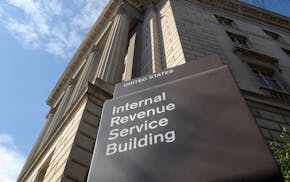A good way to guarantee you'll be wrong about something is to predict the future of technology. As in, "One day, we'll all …" Experts can hazard guesses about artificial intelligence, driverless cars or the death of cable television, but technological innovation and societal change aren't orderly. They disregard expectations. They're dynamic. No one knows how trends will play out.
So how was it that the U.S. Department of Justice was certain AT&T's $85 billion deal to acquire Time Warner would "greatly harm" consumers — even as the digital communications and entertainment industries are being blown apart and reinvented? No one could have anticipated the iPhone, Facebook or Netflix. No one knows what's going to happen next on big or little screens, especially not antitrust lawyers in Washington. It would make more sense to give innovative companies room to compete and then let customers decide how to spend their time and where to spend their money.
That philosophy of encouraging — not stifling — competition and innovation is the big takeaway from a federal court decision Tuesday that ruled AT&T can move ahead with its purchase of Time Warner. The Trump administration's Justice Department sued to block or impose major conditions on the merger, which would bring together a content distributor (AT&T is a wireless, broadband and satellite TV provider) and a content creator (Time Warner owns HBO, CNN and a movie studio).
U.S. District Judge Richard Leon wisely slapped down the government's arguments predicting customers would have to pay more for the combined company's services. Now the AT&T-Time Warner merger can proceed — and so too can other potential deals. That is, this court case, which could have emboldened the Trump administration, is now likely to chasten Justice lawyers, thus encouraging similar mergers. There was a sign of that Wednesday when Comcast (essentially a distributor) jumped into the bidding for pieces of 21st Century Fox (essentially a creator).
It's all exciting, unknowable stuff, which the Justice Department shouldn't be trying to anticipate and regulate. This is the reason we supported the Federal Communications Commission's move to do away with net neutrality, the federal government's regulatory controls on internet providers: Because increased competition is a greater spur to technological innovation than government fiat.
FROM AN EDITORIAL IN THE CHICAGO TRIBUNE
Readers Write: Politicized education, presidential debates, election strategies, small-town papers

Taxes increasingly paying for the past — not the future
!["Since the [Hennepin Healthcare System] Board took control in 2007, CEO pay increased by more than 142%. Meanwhile, that same board sunsetted employee](https://arc.stimg.co/startribunemedia/J7MD7DSJWMP3KYIYUSCQTABOAA.jpg?h=91&w=145&fit=crop&bg=999&crop=faces)

